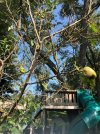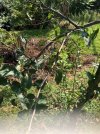BrushyPines
5 year old buck +
I have several fruit trees on my property (Persimmon, Crabapple, Pear, Plum, Mulberry). They are young trees ranging from 2-7 years old. Do I need to spray these trees for protection against insects every year?
what are your thoughts on dormant oil spray?Not as a preventive. I would spray for insects when the damage level is headed for a level that cant be tolerated by the tree or you. Not sure where you are located, but Japanese Beetles, bagworms and grasshoppers will be your biggest insect pests unless you are growing for a high level of fruit quality, and with the trees you have listed I would assume that they are likely intended for wildlife consumption.
My big question on the dormant oil spray has been on the timing of things, do people spray late winter before pruning? After pruning? Will it harm the tree if you spray after pruning and they aren’t fully healed up?


This past weekend I was down to our property for the first time since July. The Japanese Beetles did a fair amount of damage since then on a few of my newly planted trees. The older ones definitely handle it better. I used the last of the Sevin dust I had, I’ll be moving to liquid in the future. Unfortunately I have to be around more often to catch the damage before it gets bad.I think its just good added insurance to provided a little added protection for those young trees... especially if your not around to be checking on them regularly ... it doesn't take long to defoliate a smaller tree, by the time you notice that damage is occurring it can be to late. I have a real "organic" approach lately for my trees - its called no time to do much with them and I really wish I had a bit more time to just get an occasional insecticide on them. The trees, especially the younger ones do seem to benefit from regular sprayings.
Same issues and I live close by to my land.... its just the evil we do to get them through till they have the size to handle the insect pressure. It will nice someday when we have better biological and organic controls ... today we are a monsanto/cargill world tomorrow who knows. Every year more bugs and more issues, wicked weather extremes - you think trees are tough try bees.This past weekend I was down to our property for the first time since July. The Japanese Beetles did a fair amount of damage since then on a few of my newly planted trees. The older ones definitely handle it better. I used the last of the Sevin dust I had, I’ll be moving to liquid in the future. Unfortunately I have to be around more often to catch the damage before it gets bad.
That's what I thought too but I can't find any on it.^^^that looks like some kind of worm/caterpillar damage